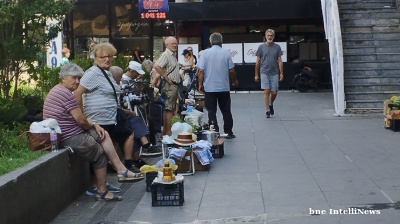Taiwan's Ambassador to Guatemala has reaffirmed the nations' "transparent, sustainable, and mutually beneficial" relationship in an interview with
bne IntelliNews following Guatemalan President Bernardo Arévalo's
trip to Taiwan on June 5.
During the visit, Arévalo affirmed Guatemala's commitment to growing ties with Taiwan, saying his people will walk together with their "brothers" in Taiwan. The two countries also cemented their technology partnership, with Taiwan supporting Guatemala's ambitions to become a key player in the semiconductor industry through the "Chip Road Map" initiative.
The deepening ties come as Beijing has been expanding bilateral and trade relationships across Latin America. The US and allies fear China is leveraging its influence across the region to pursue geopolitical goals, including further isolating Taiwan and bolstering support for authoritarian regimes in Nicaragua, Cuba and Venezuela. Guatemala is one of only 12 countries worldwide to retain formal ties with Chinese-claimed Taiwan.
Trade imbalance highlights different approaches
Despite fears of further isolation, Ambassador Vivia Chang stressed her confidence in Taiwan's and Guatemala's developing strategic partnership. "Our cooperation with Guatemala is comprehensive," she told bne Intellinews. "Economically, Taiwan supports Guatemala's agricultural exports, MSMEs (Micro, Small and Medium Enterprises), and now Taiwan also supports Guatemala's participation in global supply chains."
Their relationship extends beyond technology. Bilateral trade between Taiwan and Guatemala reached $340mn in 2024, with sugar-related products (over 70%) and coffee (14%) comprising Guatemala's $149mn in exports. Taiwan exported $191mn, mainly through alkylbenzene mixture goods (23.8%), diesel (13.9%), and ventilators and extractors (4.6%).
Chang noted that during the same period, trade between China and Guatemala heavily favoured China by $4.8bn to $43.7mn. "The statistics demonstrate that Taiwan is willing to maintain a mutually beneficial trade relationship, whilst China only tends to sell its over-produced goods to support its domestic economy with little to no intention to purchase from Guatemala," said Chang.
Beyond trade: health and development partnerships
Chang emphasised her nation's commitment to fostering relationships beyond commerce, with investments in health infrastructure, education and rural development. In February 2025, a public health project was launched to deliver dental, paediatric, and general medical services to 10,000 families in rural Guatemala, aimed at improving access to essential healthcare in underserved communities.
"True partnerships must be rooted in shared values, transparency, and mutual trust," said Chang. "Taiwan has learned that listening to our partners' evolving needs and responding with respect and sincerity is key. We also continue to engage civil society, academia, and local communities to ensure our presence is meaningful and enduring beyond just government-to-government ties."
China's regional strategy and mixed results
Chinese state enterprises have emerged as major investors across Latin America, particularly in energy, infrastructure, and space sectors. Since 2021, China has served as the region's largest trading partner, surpassing the United States.
In May 2025, Beijing hosted the
China-CELAC summit, where President Xi Jinping announced a $9bn investment credit line for Latin American and Caribbean leaders. Guatemala and Belize, two of Taiwan's key remaining regional allies, were notably absent from the summit.
China's investment offers have successfully enticed Latin American nations. In March 2023, Honduras shifted diplomatic relations from Taiwan to China after Beijing offered to help build Honduras's Patuca II hydroelectric dam. At the time, Honduras faced crippling $600mn debt to Taiwan, which Taiwan said it could not pardon.
After switching allegiance, two Chinese-backed hydropower stations have been completed in Honduras, with two more planned alongside investment in water infrastructure and solar energy. Trade agreements were also signed, eliminating tariffs on agricultural products including shrimp, a key Honduran export. However, the possibility of future debt incurrence from such developments remains unclear.
Promises versus reality
Yet Chang argues China has not delivered on the promises that prompted the switch and have, in fact, crippled Honduras's shrimp market. In 2022, Taiwan purchased 22mn pounds (9.98mn kg) of Honduran white shrimp — accounting for nearly 40% of total exports. By the end of 2024, after the alliance change, China had only purchased between 80,000-400,000 pounds, equalling 2-4 containers of Honduran shrimp, causing Honduras to lose over $47.7mn in export income and axe over 6,000 jobs related to the shrimp industry.
Another example is Nicaragua's Interoceanic Canal Project. In 2014, Nicaragua granted China-backed HKNED Group a 100-year concession to build a $50bn, 172-mile waterway to rival the congested Panama Canal. However, apart from a groundbreaking ceremony in 2014, no major construction occurred, causing the Ortega regime to revoke the project in May 2024.
Diplomatic tensions continue
After the Guatemalan president visited Taiwan in June 2025, China said that recognising the one-China principle and developing relations with China align with Guatemala's fundamental interests.
In a daily briefing, Chinese spokesperson Lin Jian said that "there is but one China in the world, Taiwan is an inalienable part of China's territory," and the People's Republic of China government is the sole legal government representing the whole of China.
Lin dismissed Taiwan's diplomatic efforts as "self-deceptive theatrics that cannot stop the overriding historical trend toward China's reunification," pointing to Beijing's diplomatic ties with 183 countries as strong evidence of international consensus.
Chang responded: "We are aware of the ongoing campaign by the People's Republic of China to isolate Taiwan diplomatically, including through economic luring and political inducements. However, we trust in Guatemala's sovereign decision-making and its consistent commitment to democratic values."
"Taiwan does not engage in chequebook diplomacy. Instead, we respond by deepening meaningful cooperation and supporting Guatemala's national development goals in transparent, sustainable, and mutually beneficial ways."



_Cropped_1756210594.jpg)




